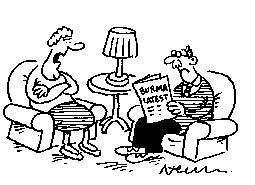In New York last week I was gobsmacked to discover I’d won the Bastiat Prize for Online Journalism. So gobsmacked that I hadn’t thought to prepare a magnanimous, funny victor’s speech, only a halting, rueful runner’s-up one.
In New York last week I was gobsmacked to discover I’d won the Bastiat Prize for Online Journalism. So gobsmacked that I hadn’t thought to prepare a magnanimous, funny victor’s speech, only a halting, rueful runner’s-up one.
No one ever gives me prizes. And it’s not purely because I’m utterly rubbish and can’t write for toffee. It’s also that I happen to live in a culture which would prefer not to reward writers of my political outlook — because, obviously, people like me are au fond baby-eating Nazis whose perfect world would look like a giant oil slick dotted with drowning polar bears and towering golden skyscrapers full of bankers in pashmina suits taking shots at humble, honest working folk with diamond-encrusted Purdeys.
That’s why I’m so heartily grateful to International Policy Network (the free-market think tank which awards the Bastiat) and to the trustees of the Charles Douglas-Home memorial prize (which is the only other prize I’ve ever won). We writers of an evil right-wing bastard persuasion need those little fillips, need them badly, because they’re probably the only two awards in the entire sphere of literature and letters that make us feel loved and wanted and necessary — and possibly even almost human.
‘Aaahh!’ some of you are going, but I don’t want your pity. I want your money. Or, failing that, some acknowledgement that I’m not banging my head against a brick wall here.
Increasingly, I do wonder. I skim the comments below Spectator blogs, for example, and they seem to be dominated by Kool-Aid-drinking Cameronistas who think the coalition is doing a splendid job with its mild singeing of the quangos, its rolling back the frontiers of state by a half an inch, and its ingenious scheme to rid our shores of all those ghastly, wealth-creating bankers and entrepreneurs by keeping the upper band tax rate nice and high and ‘fair’.
‘Et vos, Speccie readers?’, it makes me think. ‘Have we really reached so dreadful a pass that even you now think like cowed supplicants of the nanny state queuing patiently for your ever-diminishing bowls of watery gruel?’
It’s at times like these that a chap’s thoughts turn to Frederic Bastiat, the 19th-century French political philosopher after whom the prize is the named. In France, he is all but unknown, for reasons which will shortly become clear. But in the US he’s revered, by Tea Partiers at least, as the author of perhaps the truest words ever written about the overweening state: ‘Government is the great fiction, through which everybody endeavours to live at the expense of everybody else.’
Reading Bastiat makes you realise how little there is new under the sun. His 1850 tract ‘The Law’ anticipates by nearly one-and-a-half centuries the cooked-up cantish outrage that followed Mrs Thatcher’s supposed ‘no such thing as society’ gaffe. ‘Socialism, like the ancient ideas from which it springs, confuses the distinction between government and society. As a result of this, every time we object to a thing being done by government, the socialists conclude that we object to its being done at all.’
He goes on to rehearse exactly the kind of straw-man arguments against liberty and free markets deployed to this day by the BBC and Guardian commentariat: ‘We disapprove of state education. Then the socialists say that we are opposed to any education… We object to a state-enforced equality. Then they say that we are against equality. And so on, and so on. It is as if the socialists were to accuse us of not wanting persons to eat because we do not want the state to raise grain.’
Well indeed. Which — as another Bastiat Prize winner, Dan Hannan, is fond of pointing out — is one of the great misconceptions about the National Health Service. Over the years we have been brainwashed into thinking that health, like education, is too important to be left to the private sector. Yet if someone were to make the same argument about clothing or food or drink, he would rightly be dismissed as barmy. There is no Ministry for Footwear. But it has been many decades since even our meanest citizen has gone unshod.
Bastiat is currently back in vogue as godfather of the Austrian School of economics, whose anti-Keynesian ethic he prefigured with his famous broken window fallacy. In this parable, Bastiat tells the story of a boy who accidentally breaks a pane in his father’s shop window, necessitating six francs of repair work. To a Keynesian or a trade unionist or a socialist or indeed anyone in the Obama and Cameron administrations, the moral is this: you can’t make an economy without breaking windows; at least the glazier gained useful employment; in fact maybe it wouldn’t be so bad if more windows were broken — think of all the economic growth it would generate!
To Bastiat, however, the moral was more subtle, which is why he titled his essay ‘That Which is Seen and That Which is Not Seen’. Yes, he agreed, the glazier would benefit to a degree from the extra work. But not the shopkeeper, who would now have six francs less to spend on areas of his choosing; nor all those tradesmen — cobblers or booksellers, say — who might otherwise have enjoyed his patronage; nor yet even the glazier himself, who might now suddenly find himself ‘negatively constrained’ by being unable to complete his other jobs on time. In short, that broken window, far from providing a net benefit to the town, in fact makes it poorer by at least the value of one window.
Such a pity, you can’t help thinking, that Bastiat appears not to have been on the reading list of Brasenose PPE undergraduates between 1985 and 1988.







Comments